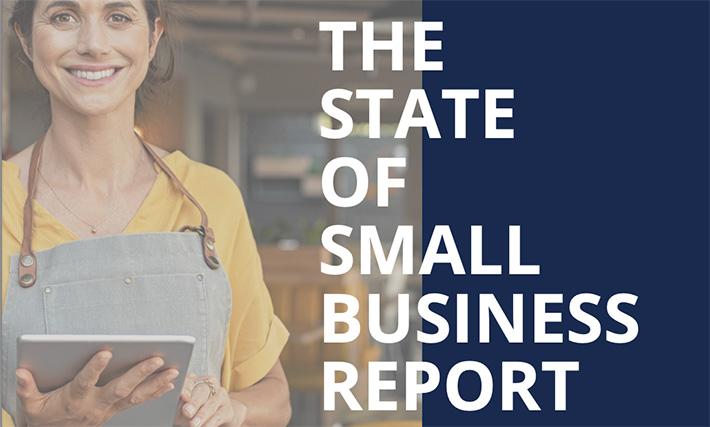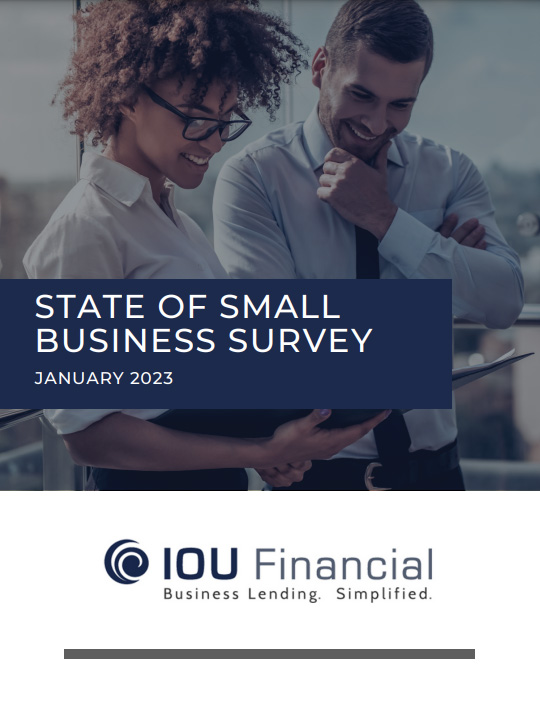Economy
Merchants Still Concerned About Inflation, Recession, (and Bird Flu?)
June 12, 2024 Seventy-eight percent of businesses expressed that they are somewhat concerned or very concerned about the cost of goods/inflation right now. The exact same percentage said the same about a possible recession. That’s according to the latest State of Small Business Report compiled by IOU Financial. Interest rates were top of mind too, though not as much as in previous survey periods. For example, while 68% said that they were somewhat concerned or very concerned about interest rates right now, that figure was the lowest recorded since Spring 2022 (at 84%), the first time that survey question was asked. Respondents were right to be concerned at the time since that’s the precise period that rates began to rapidly rise from 0% to the >5% level that they’re currently at.
Seventy-eight percent of businesses expressed that they are somewhat concerned or very concerned about the cost of goods/inflation right now. The exact same percentage said the same about a possible recession. That’s according to the latest State of Small Business Report compiled by IOU Financial. Interest rates were top of mind too, though not as much as in previous survey periods. For example, while 68% said that they were somewhat concerned or very concerned about interest rates right now, that figure was the lowest recorded since Spring 2022 (at 84%), the first time that survey question was asked. Respondents were right to be concerned at the time since that’s the precise period that rates began to rapidly rise from 0% to the >5% level that they’re currently at.
Of the respondents who answered the write-in portion, a little less than half cited access to proper funding as among the biggest challenge to running their business right now and as the reason they are being held back from growing their business. Concerns about being able to hire qualified staff was also cited on several occasions, an issue that has persisted since the bi-annual survey first started asking about it.
Notably, IOU has persistently asked respondents to weigh in on their concerns about public health as a business challenge despite the world largely having moved on from covid already. While it would come as no surprise then that the percentage of respondents that were somewhat concerned or very concerned about public health in Spring 2022 (63%) had dropped in half by Fall 2022 (30%), the percentage has slowly crept upwards ever since. Fifty-one percent of respondents said that they are currently somewhat concerned or very concerned about public health. Since no further questions were asked to elaborate on that selection, one wonders if they were referring to the recent headlines about Bird Flu.
Are Interest Rate Cuts Not Actually Around the Corner?
April 18, 2024 If you were planning on the current interest rate environment loosening up this year, it may be time to reconsider. Inflation is actually going back up, not down. Plus, unemployment is still relatively low and the stock market is near all time highs, with a new record having been set just recently! Even the media which had predicted a minimum of 3 rate cuts this year alone is changing its tune. If you don’t believe us, look:
If you were planning on the current interest rate environment loosening up this year, it may be time to reconsider. Inflation is actually going back up, not down. Plus, unemployment is still relatively low and the stock market is near all time highs, with a new record having been set just recently! Even the media which had predicted a minimum of 3 rate cuts this year alone is changing its tune. If you don’t believe us, look:
4/17/24 – The Economist: America’s interest rates are unlikely to fall this year
4/17/24 – CNBC: Wall Street pushes out rate-cut expectations, sees risk they don’t start until March 2025
4/17/24 – Fox Business: Interest rate cut odds dwindle as inflation progress stalls
4/16/24 – Washington Post: The sobering message from the Fed: Interest rate cuts aren’t coming soon
4/15/24 – Axios: The U.S. may be entering a new era of persistently high interest rates
It could even go the other direction. According to CNN, “The Fed might not be done raising interest rates just yet.” Most companies in the industry by now had already adjusted to the current environment (if they’re still around), but it could continue like this for a long or even get more expensive. Prepare accordingly.
Surprising Stats of 2023
December 27, 2023Remember when interest rates soared, banks collapsed, and experts began to prepare for the worst? Well, appearances can be deceiving.
Business loan origination volume at Square, Enova, Shopify, and Funding Circle are all on track to surpass 2022’s numbers. When it came to bad debt, PayPal was the only large tech lender to announce that it had become a problem this year. PayPal’s origination numbers are consequently also down year-over-year.
The S&P 500 was at 3,839.50 one year ago and closed at 4,774.75 yesterday, a gain of more than 24%.
Unemployment was 3.5% last December and had only modestly increased to 3.7% this November.
Inflation was 7.1% last November and only 3.1% this November.
Bitcoin is up by 150% year-over-year!
Anecdotal reports at smaller non-public small business funders, however, have hinted at bad debt increases all year and underwriting has generally become more conservative. Despite this, brokers are still brokering deals and funders are still funding. The predicted mass AI-induced layoffs have also not yet materialized. In the grand scheme of things, the argument could be made that 2023 was actually a pretty good year.
But 2024 could be dicey.
- The FCC closed the lead generator loophole.
- The first wave of small business finance companies will have to begin complying with new CFPB regulations.
- It will be a presidential election year like none ever experienced before.
- Americans are overleveraged. Forty percent of student loan borrowers failed to make a payment after the covid-era pause ended.
- General economic, societal, and political unease.
So what will happen? I guess we’ll find out. It could be terrible or awesome or anything in between.
Hiring in the B2B Finance Industry Still Challenging
November 21, 2023 “To say that hiring is a difficult process is an understatement and I think that it’s a direct reflection of the labor market and the volatility in America’s labor market right now,” said Manny Yosipov, CEO at Advanced Recovery Group. Yosipov’s company does collections in the MCA and business lending space, where like many other industries, persistently low unemployment coupled with a workforce tuned into lifestyle accommodations has made the hiring environment challenging.
“To say that hiring is a difficult process is an understatement and I think that it’s a direct reflection of the labor market and the volatility in America’s labor market right now,” said Manny Yosipov, CEO at Advanced Recovery Group. Yosipov’s company does collections in the MCA and business lending space, where like many other industries, persistently low unemployment coupled with a workforce tuned into lifestyle accommodations has made the hiring environment challenging.
“You have quality talent now that want remote work and a lot of flexibility,” said Yosipov. “I think that it’s hardest for companies that have started pre-covid, survived covid, and are now trying to grow and scale in the post covid market.”
Daniel Hye, ISO Relations Manager at Zahav Asset Management, said that if remote work wasn’t in such high demand, the open positions would have likely been filled by now. Zahav is currently looking to fill an underwiting and collections role.
“We could have already had someone, but we really don’t want remote because it makes a huge difference with the way things work,” Hye said. “Especially in our industry, everything’s about speed. You want to walk over to the underwriter or you want to turn around to the underwriter and say, ‘Hey, this deal, the ISO just called me, can we get this done? Or this was a mistake? Can you do this?’ Once it’s remote it changes the whole dynamics of how everything works.”
“I mean, remote is very preferred by a lot of people,” said Carli Bova-Chezem, Director of Human Resources at Capital Gurus, “but it’s kind of funny I talked to so many people all the time and it really isn’t for everybody. I get handfuls of people that are like, ‘I’ve been remote for the last month but I really want that camaraderie of an office and I miss being around people.’”
Capital Gurus has used a variety of sources to recruit but they’re now using an end-to-end hiring system called Breezy. Bova-Chezem said that it’s increased their application rate while streamlining the process.
“There’s a plethora of places that these applicants are coming from,” said Bova-Chezem. “Up until I’d say about a month ago, it was primarily LinkedIn, which is obviously a great resource, but we’ve gotten a lot more outreach using this new system, which has been great.”
Hye of Zahav, meanwhile, says they’ve also tried a variety of systems but that it comes down to finding job applicants with proper experience. “I think the biggest issue is being able to find someone who fits the criteria and is happy to get involved,” Hye said.
Interest Rate Cuts Unlikely For a Couple of Years
June 14, 2023 Just because the Fed decided to maintain interest rates where they are doesn’t mean that a turning point for future decreases is on the horizon. On the contrary, Fed Chair Jerome Powell said cuts are unlikely for a couple of years, citing persistent inflation.
Just because the Fed decided to maintain interest rates where they are doesn’t mean that a turning point for future decreases is on the horizon. On the contrary, Fed Chair Jerome Powell said cuts are unlikely for a couple of years, citing persistent inflation.
Excerpted as:
“[rate cuts] will be appropriate at such time as inflation is coming down really significantly, and again we’re talking about a couple years out, I think as anyone can see not a single person on the committee wrote down a rate cut this year, nor do I think it is likely to be appropriate…”
Watch the full statement
Jerome Powell says the Fed is "talking about a couple of years out" for rate cuts https://t.co/ml1Kxoivxm pic.twitter.com/ayMJmqeViT
— Bloomberg Markets (@markets) June 14, 2023
Navigating Debt in A Post-COVID World: How Collections Agencies and Individuals Must Adapt
March 14, 2023 It’s been a hectic few years on the economic front.
It’s been a hectic few years on the economic front.
From the shaky first days of the COVID-19 pandemic and the havoc in the economic system still ongoing, to the supply chain shocks and Russia’s war in Ukraine, it has been a time of deep economic uncertainty.
These crises had–and continue to have–a significant impact on individuals and businesses around the world. As many lost their jobs and saw their income reduced, it is likely that a large percentage accumulated debt during this time, furthering the financial struggles up the chain as more and more businesses had to contort themselves to stay afloat, despite their outstanding receivables.
As economies begin to recover and adapt to the current moment, businesses will be looking to collect what they are owed, but it’s important to consider how debt collection practices may evolve in a post-COVID world and how individuals and businesses can manage their debt.
Debt collection practices have traditionally been viewed as harsh and unforgiving, but as the world adapts to the new normal, the collection industry will need to evolve to be more compassionate and flexible.
As collections agencies, our job is to represent the interests of our clients who are looking to collect what is owed to them and recover as much of it as possible.
Collection agencies will need to take into account the fact that many people and businesses have been hit hard by the pandemic, and may not be in a position to repay their debts in full or at the pace creditors are used to.
One way in which collection agencies can evolve is by offering some form of a settlement that would involve a more flexible repayment plan. Rather than insisting on a fixed repayment schedule, collection agencies may need to consider allowing debtors to make smaller, more manageable payments over a longer period of time. This could involve negotiating a lower interest rate or waiving fees.
Another way in which collection agencies can adapt to the current moment is by offering debtors a reduction in the overall debt if the full balance is paid in lump. This involves the debtor agreeing to pay a lump sum amount that is less than the total amount owed. In some cases, this may be the only viable option for debtors who are struggling to make payments, and the only way a business can expect to see any of their money back. Collection agencies can be the conduit and work with both sides to negotiate a settlement that is reasonable and manageable for all parties involved.
Communication is also key, and never more important than it is right now. It’s crucial for collection agencies to be transparent and open in their communications with debtors. This means providing clear information about the amount owed, the payment schedule, and any fees or penalties that may be incurred. It also means being open to questions and concerns from debtors and providing them with accurate and timely information about their debt.
For individuals and businesses struggling with debt, there are several steps that can be taken to manage their debt effectively. Proactively communicating and working with your creditors offers the best chance at a reconciliatory solution.
The first step is to assess the situation and determine the total amount owed. This can be done by reviewing credit reports and contacting creditors to obtain a full picture of the debt.
Once the amount owed has been determined, the next step is to create a budget that takes into account all income and expenses. This will help to identify areas where expenses can be reduced and savings can be made. It may also be necessary to consider increasing income by taking on additional work or selling assets.
Once a budget has been established, it is important to prioritize debt repayment. This may involve negotiating a repayment plan with creditors or seeking the assistance of a credit counseling service. In some cases, it may be necessary to consider a debt consolidation loan or a balance transfer credit card to simplify payments and reduce interest rates.
Finally, it is important to maintain a positive attitude and stay focused on the goal of becoming debt-free. This may require making difficult decisions and sacrifices in the short term, but the long-term benefits of debt freedom are well worth the effort.
With a good-faith-first approach from creditors, debtors and collection agencies, it is possible to manage and clear debt effectively, even in an uncertain economic climate, and achieve financial security for all parties.
Small Business Fears Are Actually Calming Down
January 31, 2023 Right now small business owners are less concerned about rising inflation, a possible recession, staffing issues, consumer demand, and public health than they were in July 2022. Those are among the findings of a recent small business survey conducted by IOU Financial. It appears the fear, uncertainty, and doubt of what the end of 2022 might bring has since subsided and even transformed into a sense of optimism!
Right now small business owners are less concerned about rising inflation, a possible recession, staffing issues, consumer demand, and public health than they were in July 2022. Those are among the findings of a recent small business survey conducted by IOU Financial. It appears the fear, uncertainty, and doubt of what the end of 2022 might bring has since subsided and even transformed into a sense of optimism!
Eighty-eight percent of respondents, for example, now project that their business will be somewhat better or much better by the end of the first half of 2023 than they are right now. Sixty-one percent say they even plan to invest in their business over the next 6 months.
The improvement in sentiment seemingly stands in stark contrast to news coming out of the large tech companies that were plagued by layoff announcements all last quarter. The small business sector is looking a little more resilient by comparison, although it still has fears of its own. Seventy-three percent of respondents are still concerned about rising inflation but that’s down from 84% in July and 44% are concerned about consumer demand but that’s down from 62% respectively.
While the circumstances of the economy aren’t exactly great and the impact of rapidly rising interest rates has yet to be determined, this survey at least suggests that small businesses are getting used to this reality.
Fintech Layoffs Pile Up
December 9, 2022 2022 has been a rough year for many fintech employees. The year started out with just a few layoffs but had an exponential increase totaling in at 219,959 layoffs from 1,405 tech companies.
2022 has been a rough year for many fintech employees. The year started out with just a few layoffs but had an exponential increase totaling in at 219,959 layoffs from 1,405 tech companies.
Financial services company Plaid, for example, recently announced plans to lay off 20% of employees, which is about 260 staff members.
“Today, I’m announcing the most difficult change we have had to make at Plaid to date,” wrote Plaid CEO Zachary Perret in a Dec. 7th website post. “I made the hard decision to reduce the size of our team, and in doing so, to say goodbye to approximately 260 talented Plaids.”
Perret alluded to over-hiring as a result of the surge in business during covid. They are not alone. Companies including Klarna, Coinbase, Kabbage, and Amazon have laid off substantial amounts of staff. January started off low with 631 employee layoffs and that later increased to over 6,000 in February. November tallied 59,785 layoffs, weighing in with the highest number of employees laid off compared to any other month this year.





























